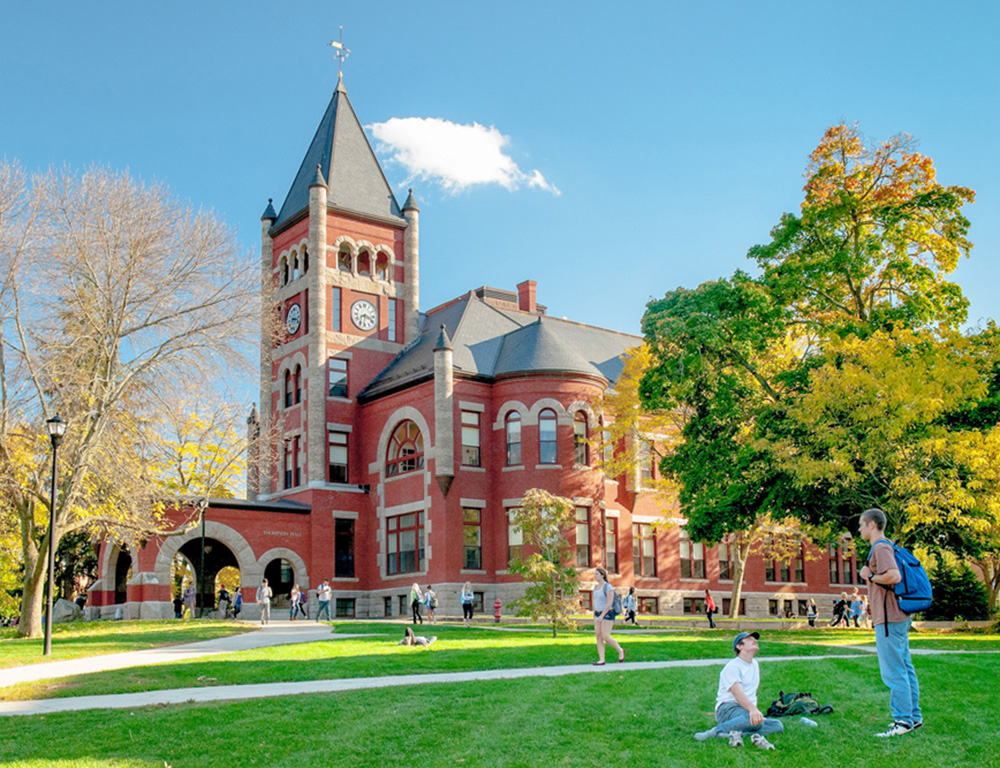-
-
-
-
Per Berglund
PROFESSOR -
Benjamin Chandran
PROFESSOR -
Olof Echt
PROFESSOR EMERITUS -
Francois Foucart
Associate Professor -
Maurik Holtrop
PROFESSOR -
Lynn Kistler
PROFESSOR -
Elena Long
Associate Professor -
David Mattingly
ASSOCIATE PROFESSOR -
Joachim Raeder
Emeritus -
James Ryan
Emeritus -
Nathan Schwadron
PROFESSOR -
Karl Slifer
PROFESSOR -
Roy Torbert
Emeritus -
Jiadong Zang
Professor
B.S. in Physics
Physics Major (B.S.)

What is a Bachelor of Science in physics?
This program prepares students for careers in physics and a broad range of related disciplines, such as systems engineering and medical physics. Students will develop the technical skills needed to explore fundamental aspects of the universe, from subatomic particles to the origin of the cosmos.
Why study physics at UNH?
This program offers introductory physics in a lecture and studio format – an active learning environment that includes group work and labs, all in a single room with a professor and graduate teaching assistants. The style allows for a coherent, connected and supportive experience. One studio course integrates the study of calculus and physics, for a deeper understanding of both subjects. The program offers concentrations in astronomy, materials science and chemical physics, which allows students to focus their learning at the undergraduate level. You’ll have many research opportunities with physics faculty and research scientists, working on projects funded by NASA, the National Science Foundation, the Department of Education, Department of Defense, National Institutes of Health and other agencies and organizations. You’ll learn how to approach, analyze and solve complex problems as you develop new technologies, methods and theories that will prepare you for a range of careers in research, engineering and education.
Potential Careers
- Accelerator operator
- Aerospace sciences
- Applied optics
- Engineering research
- Fluids engineering and research
- High school physics teacher
- Materials research
- Medical physics
- Physical sciences technician
- Software engineering
- Systems engineering
Contact
DeMeritt Hall 237A
9 Library Way
Durham, NH 03824
Phone: (603) 862-2669
Email: physics.dept@unh.edu
Curriculum & Requirements
The bachelor of science degree in physics prepares students for professional work as physicists, and is the first step toward graduate work in physics. It is also excellent preparation for graduate programs in medicine, law, or engineering, as well as for technical jobs in industry. The required courses are those typically necessary for admission to graduate study in physics or astronomy.
Suggested Plan of Study
In this degree plan, "electives" include Discovery courses, Writing Intensive Courses, Physics electives, or electives required to meet 128 credit graduation requirement.
| First Year | ||
|---|---|---|
| Fall | Credits | |
| PHYS 400 | Physics Seminar I | 1 |
| PHYS 407 | General Physics I | 4 |
| MATH 425 | Calculus I | 4 |
| ENGL 401 | First-Year Writing | 4 |
| CHEM 403 or CHEM 405 | General Chemistry I or Chemical Principles for Engineers | 4 |
| Credits | 17 | |
| Spring | ||
| PHYS 408 | General Physics II | 4 |
| MATH 426 | Calculus II | 4 |
| CS 410P or IAM 550 | Introduction to Scientific Programming/Python or Introduction to Engineering Computing | 4 |
| Discovery Elective | 4 | |
| Credits | 16 | |
| Second Year | ||
| Fall | ||
| PHYS 505 & PHYS 506 | General Physics III and General Physics III Laboratory | 4 |
| PHYS 508 | Thermodynamics and Statistical Mechanics | 4 |
| MATH 528 or MATH 525 | Multidimensional Calculus or Linearity I | 0-6 |
| PHYS 601 | Computational Physics Recitation I | 1 |
| Discovery Elective | 4 | |
| Credits | 13-19 | |
| Spring | ||
| PHYS 615 | Classical Mechanics and Mathematical Physics I | 4 |
| PHYS 605 | Experimental Physics I | 5 |
| PHYS 602 | Computational Physics Recitation II | 1 |
| Select one of the following two options: | 8 or 6 | |
(1) For students who took MATH 528: | ||
MATH 527 & MATH 645 | Differential Equations with Linear Algebra and Linear Algebra for Applications | |
(2) For students who took MATH 525: | ||
MATH 526 | Linearity II | |
| Credits | 18-16 | |
| Third Year | ||
| Fall | ||
| PHYS 616 | Classical Mechanics and Mathematical Physics II | 4 |
| PHYS 701 | Quantum Mechanics I | 4 |
| Discovery or Major Electives | 8 | |
| Credits | 16 | |
| Spring | ||
| PHYS 702 | Quantum Mechanics II | 4 |
| PHYS 703 | Electricity and Magnetism I | 4 |
| Discovery or Major Electives | 8 | |
| Credits | 16 | |
| Fourth Year | ||
| Fall | ||
| PHYS 704 | Electricity and Magnetism II | 4 |
| PHYS 705 | Experimental Physics II | 4 |
| Discovery or Major Elective | 4 | |
| Capstone | 4 | |
| Credits | 16 | |
| Spring | ||
| Electives | 12 | |
| Capstone | 4 | |
| Credits | 16 | |
| Total Credits | 128-132 | |
Degree Requirements
All Major, Option and Elective Requirements as indicated.
*Major GPA requirements as indicated.
Major Requirements
| Code | Title | Credits |
|---|---|---|
| Required Courses | ||
| PHYS 400 | Physics Seminar I | 1 |
| PHYS 407 | General Physics I | 4 |
| PHYS 408 | General Physics II | 4 |
| PHYS 505 & PHYS 506 | General Physics III and General Physics III Laboratory | 4 |
| PHYS 508 | Thermodynamics and Statistical Mechanics | 4 |
| PHYS 601 | Computational Physics Recitation I | 1 |
| PHYS 602 | Computational Physics Recitation II | 1 |
| PHYS 605 | Experimental Physics I | 5 |
| PHYS 615 | Classical Mechanics and Mathematical Physics I | 4 |
| PHYS 616 | Classical Mechanics and Mathematical Physics II | 4 |
| PHYS 701 | Quantum Mechanics I | 4 |
| PHYS 702 | Quantum Mechanics II | 4 |
| PHYS 703 | Electricity and Magnetism I | 4 |
| PHYS 704 | Electricity and Magnetism II | 4 |
| PHYS 705 | Experimental Physics II | 4 |
| Select two electives from the following: | 8 | |
PHYS 708 | Optics | |
PHYS 710 | Astrophysics I | |
PHYS 712 | Space Plasma Physics | |
PHYS 718 | Condensed Matter Physics | |
PHYS 720 | Nuclear Physics | |
PHYS 764 | General Relativity and Cosmology | |
MATH 747 | Introduction to Nonlinear Dynamics and Chaos | |
MATH 753 | Introduction to Numerical Methods I | |
| Chemistry: | ||
| CHEM 403 | General Chemistry I | 4 |
| or CHEM 405 | Chemical Principles for Engineers | |
| Mathematics: | ||
| MATH 425 & MATH 426 | Calculus I and Calculus II | 8 |
| Select one of the following options: 2 | 12 | |
Option A: | ||
MATH 525 & MATH 526 | Linearity I and Linearity II 2 | |
Option B: | ||
MATH 528 | Multidimensional Calculus | |
MATH 527 | Differential Equations with Linear Algebra | |
MATH 545 | Introduction to Linear Algebra | |
or MATH 645 | Linear Algebra for Applications | |
| Computer Programming: | ||
| CS 410P | Introduction to Scientific Programming/Python | 4 |
| or IAM 550 | Introduction to Engineering Computing | |
| Capstone: 3 | 2-8 | |
PHYS 795 & PHYS 799 | Independent Study and Thesis | |
or INCO 790 & PHYS 799 | Advanced Research Experience and Thesis | |
or PHYS 798 | Senior Project | |
| Total Credits | 90-96 | |
- 1
Note that no physics course can satisfy these requirement for a physics major. The rationale behind this is that a course in physics does not broaden the education of a physics major.
- 2
The Department generally recommends MATH 645 Linear Algebra for Applications over MATH 545 Introduction to Linear Algebra for physics majors.
- 3
A capstone experience is required of all physics majors during their senior year. The Physics Department encourages students to write a senior thesis (PHYS 799 Thesis) for their capstone experience. Other options include independent study research projects (PHYS 795 Independent Study or INCO 590 Student Research Experience) or a special project as part of senior lab (PHYS 705 Experimental Physics II). All capstone experiences must be approved by the undergraduate committee during the student's penultimate semester.
By the end of the spring semester of the sophomore year, a student must have a minimum grade of C in each 400- or 500-level course specifically required for the B.S. degree and an overall grade-point average of at least 2.33 in these courses in order to continue in the B.S. program.
Physics Electives
In the following table, "electives" include Discovery courses, writing-intensive courses, physics electives, and free-choice electives. Note that physics electives can only be taken in the junior or senior year because of prerequisites, and are in general offered every other year.
| Code | Title | Credits |
|---|---|---|
| PHYS 708 | Optics | 4 |
| PHYS 710 | Astrophysics I | 4 |
| PHYS 712 | Space Plasma Physics | 4 |
| PHYS 718 | Condensed Matter Physics | 4 |
| PHYS 720 | Nuclear Physics | 4 |
| PHYS 764 | General Relativity and Cosmology | 4 |
- Students will master the fundamentals of mechanics, electricity and magnetism, quantum mechanics, and thermodynamics.
- Students will have a solid understanding of calculus, differential equations, and linear algebra and be able to use mathematics to solve physics problems.
- Students will be able to solve physics problems using computational methods.
- Students will be proficient at taking measurements in a physics lab and analyzing measurements to draw valid conclusions.
- Students will be well prepared for graduate study in physics and related disciplines.
- Students will be well prepared for technical careers.
- Students will be able to present scientific ideas effectively in both written and oral form.



























